- Your cart is empty
- Continue Shopping
DNHE-1 in English Solved Assignment 2024 (Part A)
₹30.00
DNHE-1 in English
Solved Assignment 2024 (Part A)
Course Code: DNHE-1
Assignment Code: DNHE-1/AST-1/TMA-1 /24
For January 2024 session last date of Submission: 30th May, 2024
For July 2024 session last date of Submission: 30th December, 2024
Maximum Marks: 100
DNHE-1 in English Solved Assignment 2024 (Part A)
Course Code: DNHE-1
Assignment Code: DNHE-1/AST-1/TMA-1 /24
For January 2024 session last date of Submission: 30th May, 2024
For July 2024 session last date of Submission: 30th December, 2024
Maximum Marks: 100
| Title Name | DNHE-1 Solved Assignment 2024 |
| University | IGNOU |
| Service Type | Solved Assignment (Soft copy/PDF) |
| Course | Diploma Programme in Nutrition and Health Education (DNHE) |
| Language | ENGLISH |
| Semester | 2024 Course: Diploma Programme in Nutrition and Health Education (DNHE) |
| Session | January 2024 and July 2024 |
| Short Name | DNHE-1 |
| Assignment Code | DNHE-1/AST-1/TMA-1 /24 |
| Product | Assignment of DNHE 2024 (IGNOU) |
| Submission Date | For January 2024 session last date of Submission: 30th May, 2024 For July 2024 session last date of Submission: 30th December, 2024 |
Assignment-1 consists of two parts and is of 100 marks. The weightage given to each part is
indicated in the brackets
A) Descriptive Type Question
B) Application Question (AQ)
Part A: Descriptive Type Question
(60 Marks)
(40 Marks)
(60 Marks)
All questions are compulsory
1. a) Define nutrition and health. Elaborate interrelationship between
nutrition and health.
b) Enumerate the functions and sources of available and non-available
carbohydrates.
(3)
(3)
2. Enlist the food sources and enumerate the functions of the following
vitamins:
a) Vitamin A
b) Vitamin D
c) Vitamin K
(2)
(2)
(2)
3. a) What points would you keep in mind while planning a balanced diet for
pregnant woman?
b) Explain in brief the various factors which influence calcium absorption.
c) Define RDA. Why safety margin is added in requirement to calculate
RDA?
(2)
(2)
(2)
4. a) Write a note on physiological changes during pregnancy.
b) Define complementary feeding. Enlist the benefits of breastfeeding.
(3)
(1+2)
5. Enumerate any 3 criteria for selection of each of the following foods:
a) Pulses
b) Flesh foods
c) Fruits
(2)
(2)
(2)
6. a) What is food spoilage? Explain the causes of food spoilage.
b) Elaborate various methods to enhance nutritive value of foods.
(1+2)
(3)
7. a) What are the clinical features of Vitamin A deficiency?
b) Give the etiology and clinical features of the following deficiency
diseases:
i) Ariboflavinosis
ii) Pellagra
(3)
(1.5+1.5)
8. a) What are the risk factors of Coronary heart Diseases?
b) Describe principles of treatment of obesity.
(3)
(3)
9. Explain briefly:
a) MUAC and BMI
b) Diet survey
c) Growth monitoring
(2)
(2)
(2)
10. a) Write about the objectives and components of ICDS Programme.
b) Give objectives, target groups and dose distribution strategy of NIPI
programme.
(3)
(2+1)
Section B – Application Question (AQ) (40 marks)
1. Based on the steps involved in planning balanced diet, prepare a diet for a sedentary lactating
mother belonging to low socio-economic group. (Refer to DNHE 1, Vol 2, Practical Manual –
Part 1, Section 6-Planning Diet-II)
(10)
2. Record height and weight of 10 (ten) college going girls/boys (18-23years) in your locality and
determine their body mass index (BMI). Classify them to identify their health status based on
WHO classification (Refer to DNHE 1 Vol 2, Unit 21, Table 21.1)
(10)
3. Visit your locality and identify 10 infant (age: 6 Months-12months) on complementary
feeding. In a table record their name, age, gender and the complementary foods introduced to
them by their mothers. Analyse whether their diet is in accordance to dietary recommendations
suggested for them. (Refer to DNHE 1 Vol 1, Unit 9)
(10)
4. Write recipes of any two vegetable dishes prepared at your home. Identify and highlight prepreparation and cooking methods involved in it. Give description/nutritional value of
identified pre- preparation and cooking methods. (Refer to DNHE-1, Vol 1, Unit-11)
DNHE-1, DNHE 1, DNHE1, DNHE-01, DNHE01, DNHE 01, DNHE-001, DNHE001, DNHE 001



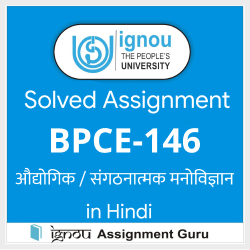


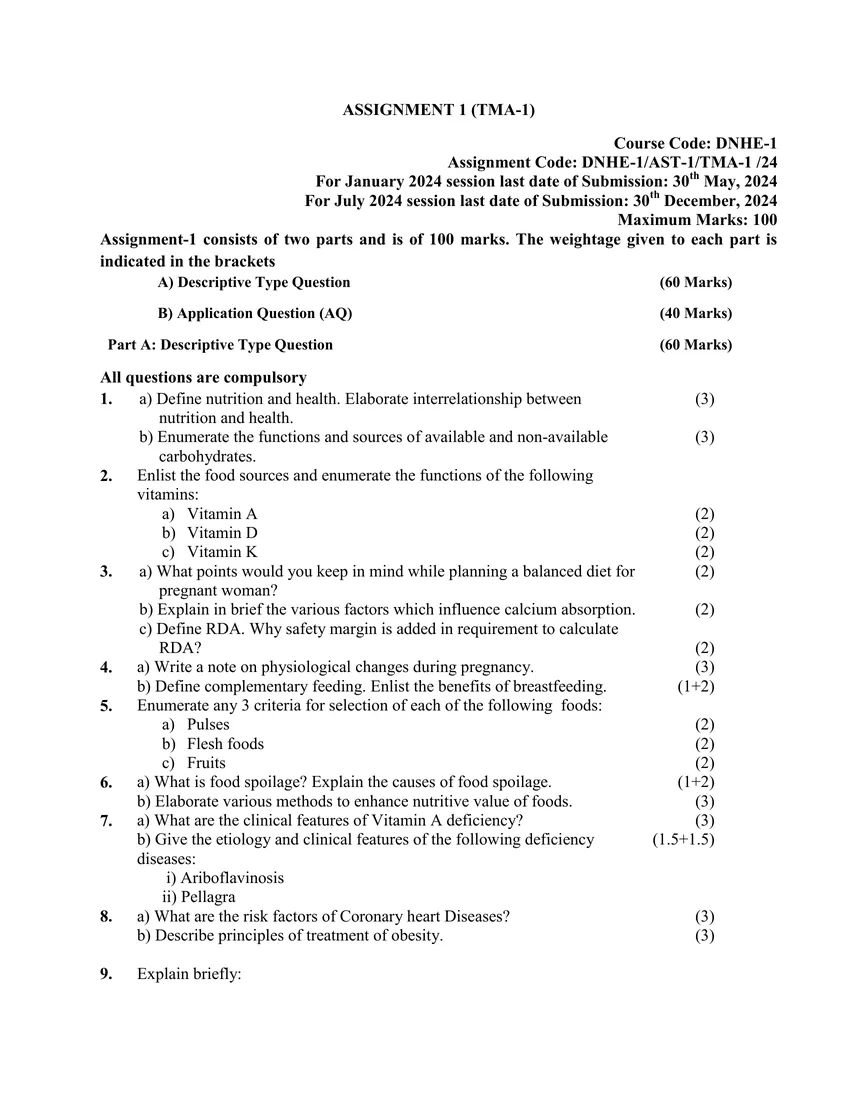
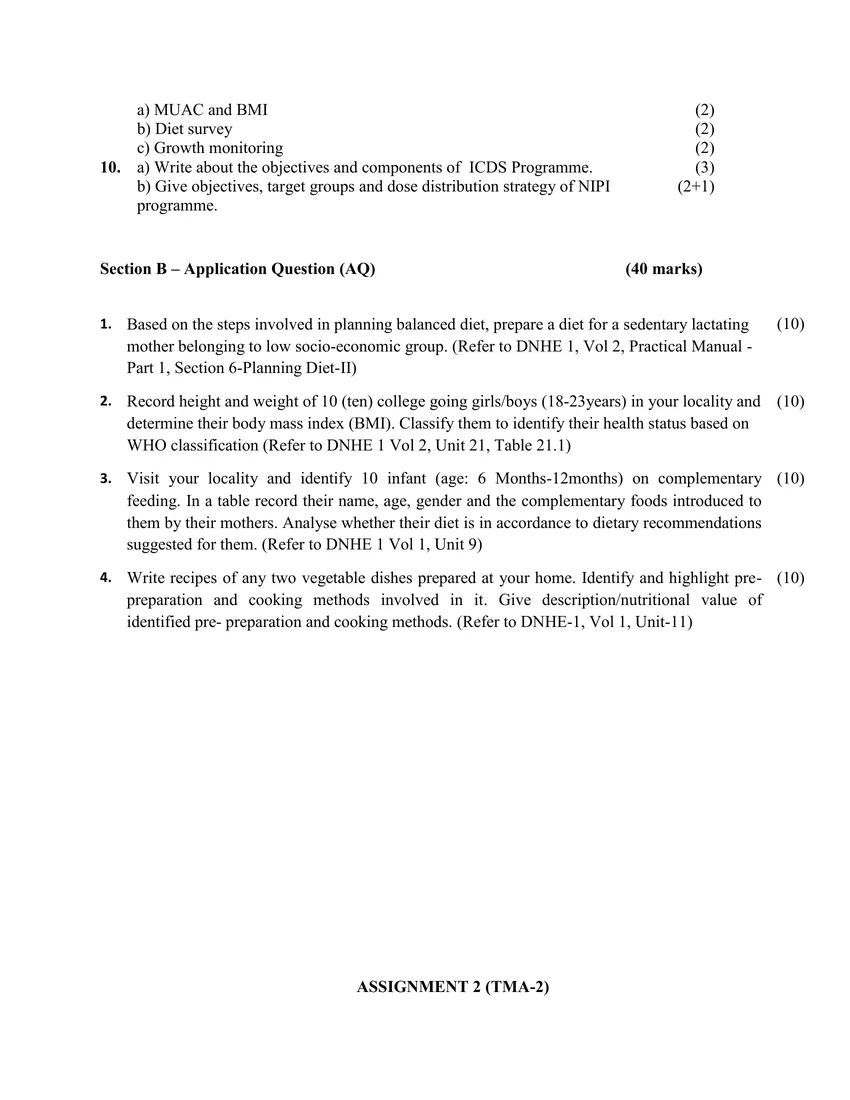

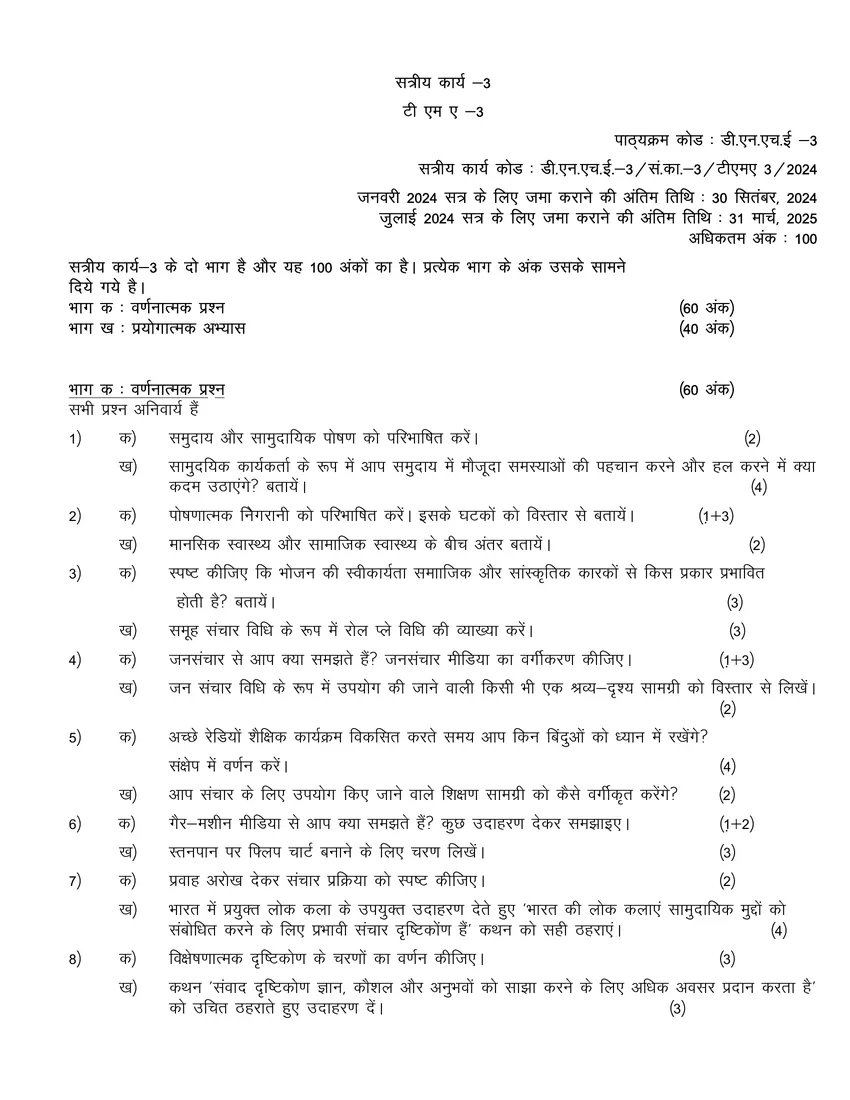
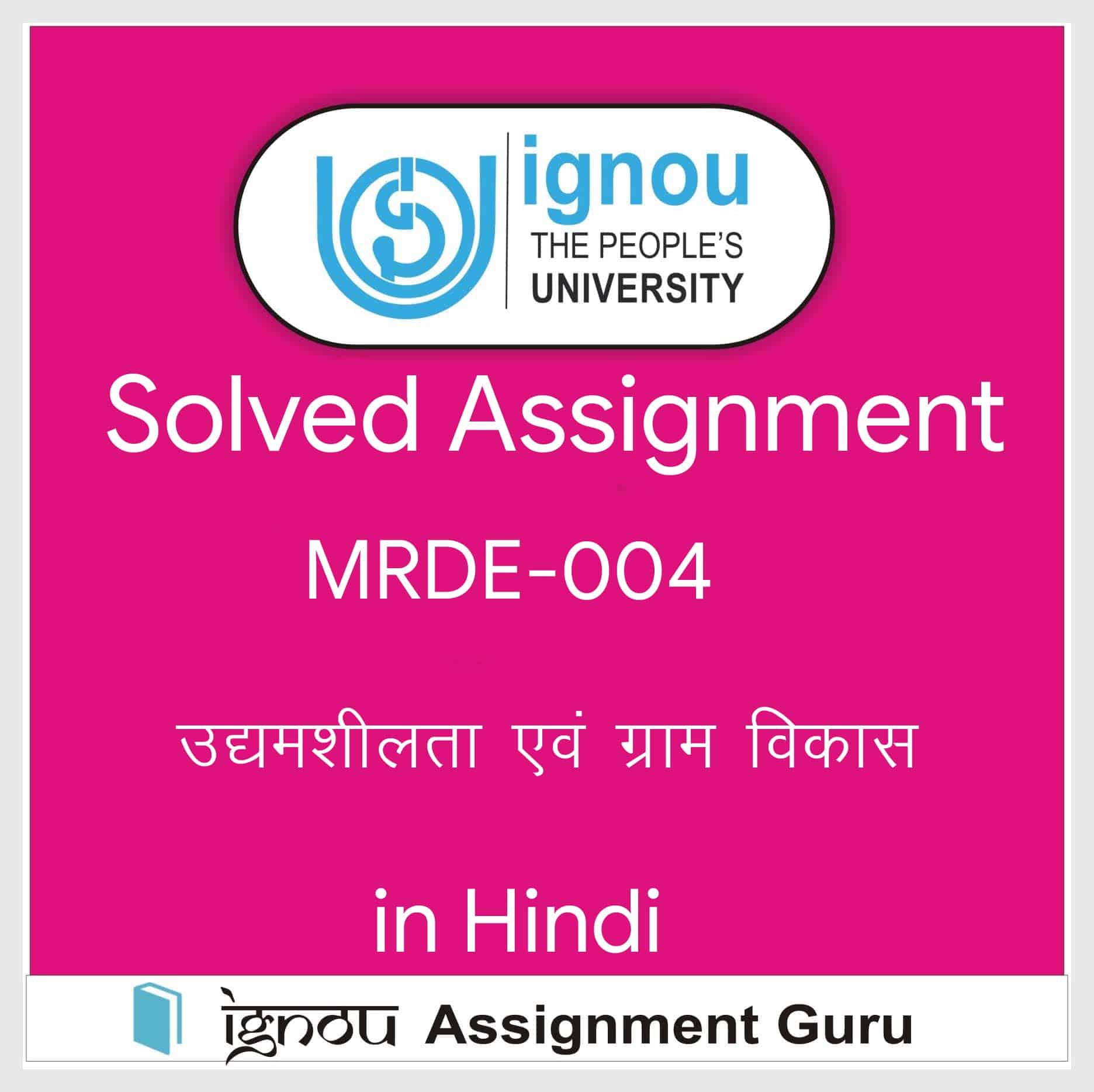


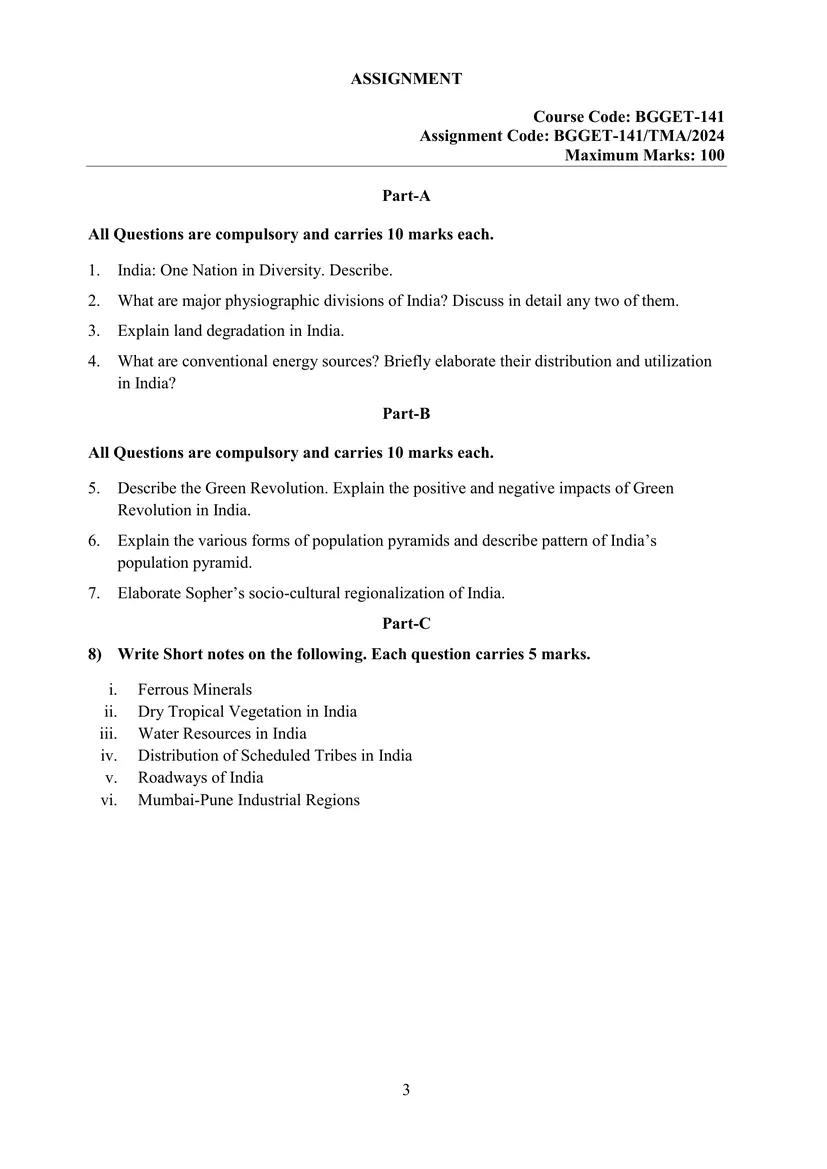

Reviews
There are no reviews yet.